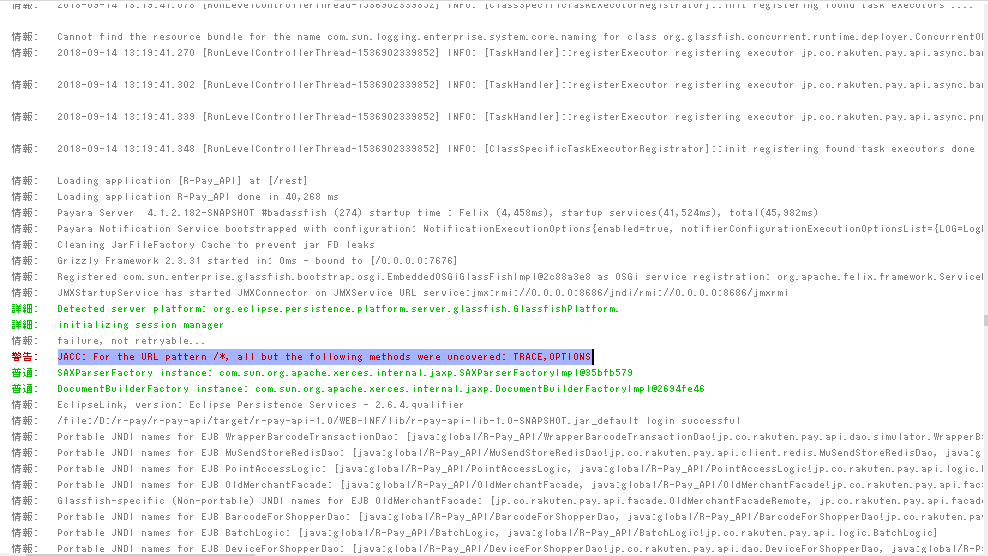可以将文章内容翻译成中文,广告屏蔽插件可能会导致该功能失效(如失效,请关闭广告屏蔽插件后再试):
问题:
In this thread, we look at examples of good uses of goto in C or C++. It\'s inspired by an answer which people voted up because they thought I was joking.
Summary (label changed from original to make intent even clearer):
infinite_loop:
// code goes here
goto infinite_loop;
Why it\'s better than the alternatives:
- It\'s specific.
goto is the
language construct which causes an
unconditional branch. Alternatives
depend on using structures
supporting conditional branches,
with a degenerate always-true
condition.
- The label documents the intent
without extra comments.
- The reader doesn\'t have to scan the
intervening code for early
breaks
(although it\'s still possible for an
unprincipled hacker to simulate
continue with an early goto).
Rules:
- Pretend that the gotophobes didn\'t
win. It\'s understood that the above
can\'t be used in real code because
it goes against established idiom.
- Assume that we have all heard of
\'Goto considered harmful\' and know
that goto can be used to write
spaghetti code.
- If you disagree with an example,
criticize it on technical merit
alone (\'Because people don\'t like
goto\' is not a technical reason).
Let\'s see if we can talk about this like grown ups.
Edit
This question seems finished now. It generated some high quality answers. Thanks to everyone,
especially those who took my little loop example seriously. Most skeptics were concerned
by the lack of block scope. As @quinmars pointed out in a comment, you can always put braces around the
loop body. I note in passing that for(;;) and while(true) don\'t give you the braces
for free either (and omitting them can cause vexing bugs). Anyway, I won\'t waste any more
of your brain power on this trifle - I can live with the harmless and idiomatic for(;;) and while(true) (just as well if I want to keep my job).
Considering the other responses, I see that many people view goto as something you always
have to rewrite in another way. Of course you can avoid a goto by introducing a loop,
an extra flag, a stack of nested ifs, or whatever, but why not consider whether goto is
perhaps the best tool for the job? Put another way, how much ugliness are people prepared to endure to avoid using a built-in language feature for its intended purpose? My take is that
even adding a flag is too high a price to pay. I like my variables to represent things in
the problem or solution domains. \'Solely to avoid a goto\' doesn\'t cut it.
I\'ll accept the first answer which gave the C pattern for branching to a cleanup block. IMO, this makes the strongest case for a goto of all the posted answers, certainly
if you measure it by the contortions a hater has to go through to avoid it.
回答1:
Heres one trick I\'ve heard of people using. I\'ve never seen it in the wild though. And it only applies to C because C++ has RAII to do this more idiomatically.
void foo()
{
if (!doA())
goto exit;
if (!doB())
goto cleanupA;
if (!doC())
goto cleanupB;
/* everything has succeeded */
return;
cleanupB:
undoB();
cleanupA:
undoA();
exit:
return;
}
回答2:
The classic need for GOTO in C is as follows
for ...
for ...
if(breakout_condition)
goto final;
final:
There is no straightforward way to break out of nested loops without a goto.
回答3:
Here\'s my non-silly example, (from Stevens APITUE) for Unix system calls which may be interrupted by a signal.
restart:
if (system_call() == -1) {
if (errno == EINTR) goto restart;
// handle real errors
}
The alternative is a degenerate loop. This version reads like English \"if the system call was interrupted by a signal, restart it\".
回答4:
If Duff\'s device doesn\'t need a goto, then neither should you! ;)
void dsend(int count) {
int n;
if (!count) return;
n = (count + 7) / 8;
switch (count % 8) {
case 0: do { puts(\"case 0\");
case 7: puts(\"case 7\");
case 6: puts(\"case 6\");
case 5: puts(\"case 5\");
case 4: puts(\"case 4\");
case 3: puts(\"case 3\");
case 2: puts(\"case 2\");
case 1: puts(\"case 1\");
} while (--n > 0);
}
}
code above from Wikipedia entry.
回答5:
Knuth has written a paper \"Structured programming with GOTO statements\", you can get it e.g. from here. You\'ll find many examples there.
回答6:
Very common.
do_stuff(thingy) {
lock(thingy);
foo;
if (foo failed) {
status = -EFOO;
goto OUT;
}
bar;
if (bar failed) {
status = -EBAR;
goto OUT;
}
do_stuff_to(thingy);
OUT:
unlock(thingy);
return status;
}
The only case I ever use goto is for jumping forwards, usually out of blocks, and never into blocks. This avoids abuse of do{}while(0) and other constructs which increase nesting, while still maintaining readable, structured code.
回答7:
I have nothing against gotos in general, but I can think of several reasons why you wouldn\'t want to use them for a loop like you mentioned:
- It does not limit scope hence any temp variables you use inside won\'t be freed until later.
- It does not limit scope hence it could lead to bugs.
- It does not limit scope hence you cannot re-use the same variable names later in future code in the same scope.
- It does not limit scope hence you have the chance of skipping over a variable declaration.
- People are not accustomed to it and it will make your code harder to read.
- Nested loops of this type can lead to spaghetti code, normals loops will not lead to spaghetti code.
回答8:
One good place to use a goto is in a procedure that can abort at several points, each of which requires various levels of cleanup. Gotophobes can always replace the gotos with structured code and a series of tests, but I think this is more straightforward because it eliminates excessive indentation:
if (!openDataFile())
goto quit;
if (!getDataFromFile())
goto closeFileAndQuit;
if (!allocateSomeResources)
goto freeResourcesAndQuit;
// Do more work here....
freeResourcesAndQuit:
// free resources
closeFileAndQuit:
// close file
quit:
// quit!
回答9:
@fizzer.myopenid.com: your posted code snippet is equivalent to the following:
while (system_call() == -1)
{
if (errno != EINTR)
{
// handle real errors
break;
}
}
I definitely prefer this form.
回答10:
Even though I\'ve grown to hate this pattern over time, it\'s in-grained into COM programming.
#define IfFailGo(x) {hr = (x); if (FAILED(hr)) goto Error}
...
HRESULT SomeMethod(IFoo* pFoo) {
HRESULT hr = S_OK;
IfFailGo( pFoo->PerformAction() );
IfFailGo( pFoo->SomeOtherAction() );
Error:
return hr;
}
回答11:
Here is an example of a good goto:
// No Code
回答12:
I\'ve seen goto used correctly but the situations are normaly ugly. It is only when the use of goto itself is so much less worse than the original.
@Johnathon Holland the poblem is you\'re version is less clear. people seem to be scared of local variables:
void foo()
{
bool doAsuccess = doA();
bool doBsuccess = doAsuccess && doB();
bool doCsuccess = doBsuccess && doC();
if (!doCsuccess)
{
if (doBsuccess)
undoB();
if (doAsuccess)
undoA();
}
}
And I prefer loops like this but some people prefer while(true).
for (;;)
{
//code goes here
}
回答13:
My gripe about this is that you lose block scoping; any local variables declared between the gotos remains in force if the loop is ever broken out of. (Maybe you\'re assuming the loop runs forever; I don\'t think that\'s what the original question writer was asking, though.)
The problem of scoping is more of an issue with C++, as some objects may be depending on their dtor being called at appropriate times.
For me, the best reason to use goto is during a multi-step initialization process where the it\'s vital that all inits are backed out of if one fails, a la:
if(!foo_init())
goto bye;
if(!bar_init())
goto foo_bye;
if(!xyzzy_init())
goto bar_bye;
return TRUE;
bar_bye:
bar_terminate();
foo_bye:
foo_terminate();
bye:
return FALSE;
回答14:
I don\'t use goto\'s myself, however I did work with a person once that would use them in specific cases. If I remember correctly, his rationale was around performance issues - he also had specific rules for how. Always in the same function, and the label was always BELOW the goto statement.
回答15:
#include <stdio.h>
#include <string.h>
int main()
{
char name[64];
char url[80]; /*The final url name with http://www..com*/
char *pName;
int x;
pName = name;
INPUT:
printf(\"\\nWrite the name of a web page (Without www, http, .com) \");
gets(name);
for(x=0;x<=(strlen(name));x++)
if(*(pName+0) == \'\\0\' || *(pName+x) == \' \')
{
printf(\"Name blank or with spaces!\");
getch();
system(\"cls\");
goto INPUT;
}
strcpy(url,\"http://www.\");
strcat(url,name);
strcat(url,\".com\");
printf(\"%s\",url);
return(0);
}
回答16:
@Greg:
Why not do your example like this:
void foo()
{
if (doA())
{
if (doB())
{
if (!doC())
{
UndoA();
UndoB();
}
}
else
{
UndoA();
}
}
return;
}



